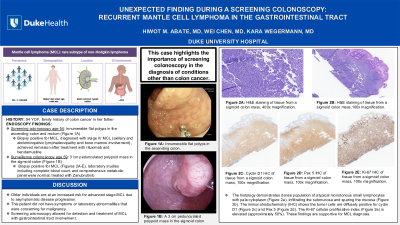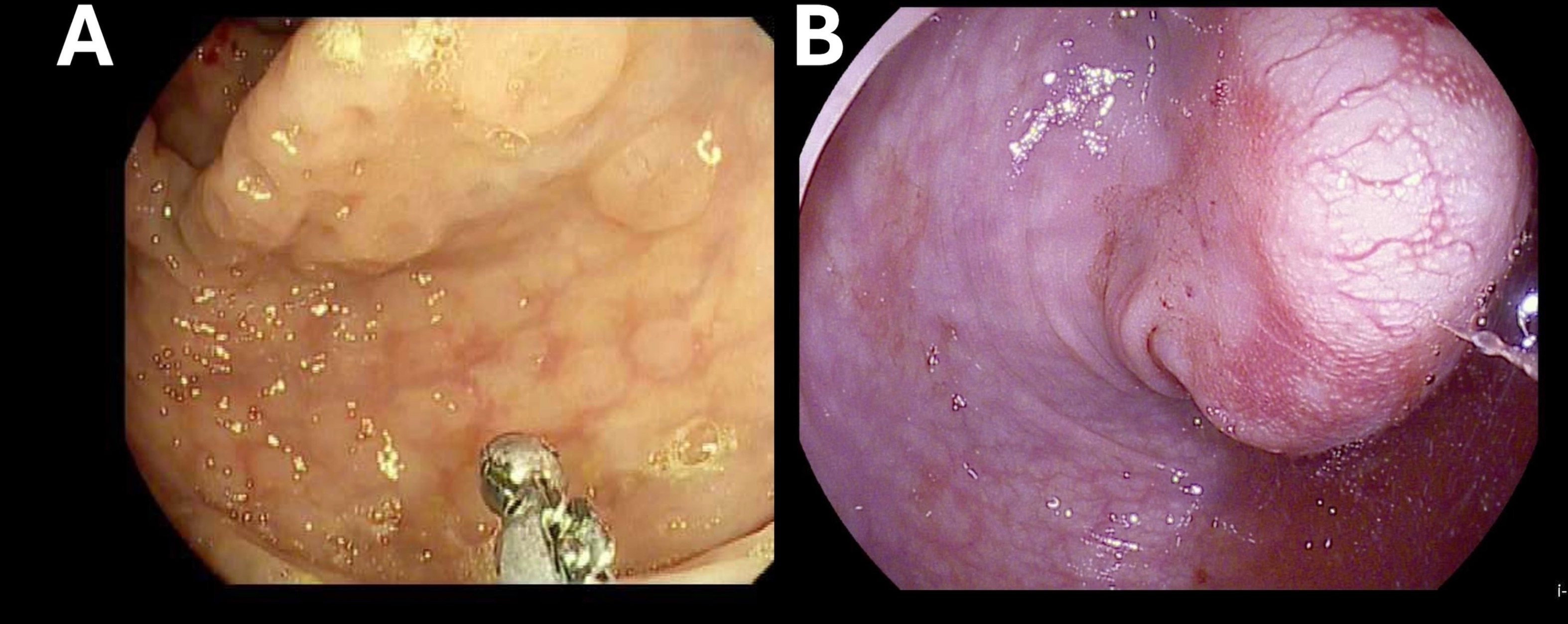Monday Poster Session
Category: Colon
P2082 - A Normal Screening Colonoscopy and Then a Polypoid Mass: Recurrent Mantle Cell Lymphoma in the Gastrointestinal Tract
Monday, October 28, 2024
10:30 AM - 4:00 PM ET
Location: Exhibit Hall E

Has Audio

Hiwot M. Abate, MD
Duke University Health System
Durham, NC
Presenting Author(s)
Hiwot M. Abate, MD1, Wei Chen, MD2, Kara Wegermann, MD1
1Duke University Health System, Durham, NC; 2Duke University, Durham, NC
Introduction: Mantle cell lymphoma (MCL) is a relatively rare, aggressive subtype of non-Hodgkin lymphoma that predominantly affects older, male, and white patients. One out of 100,000 individuals are diagnosed with MCL each year in the United States. The most common type of MCL arises from lymph nodes and can spread to other organs including the gastrointestinal tract. Gastrointestinal tract involvement is present in up to one-quarter of patients, and usually presents as a polyp or mass.
Case Description/Methods: A 54-year-old woman with a family history of colon cancer in her father underwent screening colonoscopy and was found to have innumerable flat polyps in the ascending colon and rectum that were positive for MCL on histopathologic evaluation (Figure 1A). PET/CT showed unilateral axillary lymphadenopathy in addition to abdominal and pelvic lymphadenopathy. Bone marrow biopsy was positive for MCL. She was diagnosed with stage IV MCL, treated with rituximab and bendamustine, and achieved clinical remission two years later. Surveillance colonoscopy five years after diagnosis revealed a 3 cm pedunculated polypoid mass in the sigmoid colon (Figure 1B). Biopsy of the mass was positive for MCL. Random colon biopsies showed multiple lymphoid aggregates that were negative for MCL. At the time of the second colonoscopy, laboratory studies including complete blood count and comprehensive metabolic panel were normal. She received treatment with Zanubrutinib.
Discussion: Our case highlights the importance of screening colonoscopy in the diagnosis of conditions other than colon cancer. Older individuals are at an increased risk for advanced stage MCL in part due to asymptomatic disease progression. This patient did not have symptoms or laboratory abnormalities that were concerning for malignancy. Therefore, the screening colonoscopy allowed for detection and treatment of MCL with gastrointestinal tract involvement.

Disclosures:
Hiwot M. Abate, MD1, Wei Chen, MD2, Kara Wegermann, MD1. P2082 - A Normal Screening Colonoscopy and Then a Polypoid Mass: Recurrent Mantle Cell Lymphoma in the Gastrointestinal Tract, ACG 2024 Annual Scientific Meeting Abstracts. Philadelphia, PA: American College of Gastroenterology.
1Duke University Health System, Durham, NC; 2Duke University, Durham, NC
Introduction: Mantle cell lymphoma (MCL) is a relatively rare, aggressive subtype of non-Hodgkin lymphoma that predominantly affects older, male, and white patients. One out of 100,000 individuals are diagnosed with MCL each year in the United States. The most common type of MCL arises from lymph nodes and can spread to other organs including the gastrointestinal tract. Gastrointestinal tract involvement is present in up to one-quarter of patients, and usually presents as a polyp or mass.
Case Description/Methods: A 54-year-old woman with a family history of colon cancer in her father underwent screening colonoscopy and was found to have innumerable flat polyps in the ascending colon and rectum that were positive for MCL on histopathologic evaluation (Figure 1A). PET/CT showed unilateral axillary lymphadenopathy in addition to abdominal and pelvic lymphadenopathy. Bone marrow biopsy was positive for MCL. She was diagnosed with stage IV MCL, treated with rituximab and bendamustine, and achieved clinical remission two years later. Surveillance colonoscopy five years after diagnosis revealed a 3 cm pedunculated polypoid mass in the sigmoid colon (Figure 1B). Biopsy of the mass was positive for MCL. Random colon biopsies showed multiple lymphoid aggregates that were negative for MCL. At the time of the second colonoscopy, laboratory studies including complete blood count and comprehensive metabolic panel were normal. She received treatment with Zanubrutinib.
Discussion: Our case highlights the importance of screening colonoscopy in the diagnosis of conditions other than colon cancer. Older individuals are at an increased risk for advanced stage MCL in part due to asymptomatic disease progression. This patient did not have symptoms or laboratory abnormalities that were concerning for malignancy. Therefore, the screening colonoscopy allowed for detection and treatment of MCL with gastrointestinal tract involvement.

Figure: Figure 1A: Innumerable flat polyps in the ascending colon. Figure 1B: A 3 cm pedunculated polypoid mass in the sigmoid colon.
Disclosures:
Hiwot Abate indicated no relevant financial relationships.
Wei Chen indicated no relevant financial relationships.
Kara Wegermann: Madrigal Pharmaceuticals – Study investigator. Mirum Pharmaceuticals – Study investigator.
Hiwot M. Abate, MD1, Wei Chen, MD2, Kara Wegermann, MD1. P2082 - A Normal Screening Colonoscopy and Then a Polypoid Mass: Recurrent Mantle Cell Lymphoma in the Gastrointestinal Tract, ACG 2024 Annual Scientific Meeting Abstracts. Philadelphia, PA: American College of Gastroenterology.
